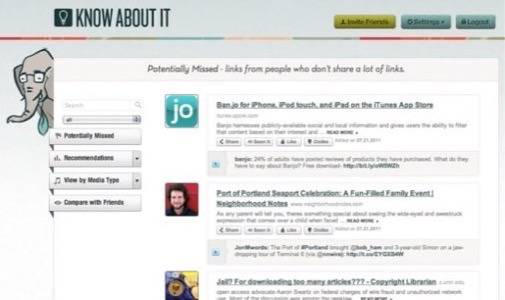Are you subscribed to enough people on Twitter, Facebook, feeds and other inbound information that you’re pretty sure you miss a lot of good things? New York startup KnowAbout.It launches out of private beta today and is now freely available to anyone who would like to tackle that problem.

The service brings in all your subscribed content from major social networks, then offers a number of different ways to sort what it finds. My favorite is the filter called “Potentially Missed – links from people who don’t share a lot of links.” All of the different sorting options make up a smart system based mostly on thoughtful permutations of publicly available, structured fields of data. How well does it work? I’m not sure yet, but I really like the idea.

You can sort for just photos, videos or music shared in your streams. You can look at the service’s recommendations, based on what it sees you expressing an interest in, and you can compare what your friends are seeing but you are not.
Music discovery was weak, technical limitations (Embed.ly API calls) made sorting for photos less appealing than it might have been and personalized recommendations were so “influenced by” what I talk about on Twitter that they were often just retweets of my own articles. I can see how once everything is working very smoothly, though, this service could deliver substantial value to users.
ReadWriteWeb’s Robyn Tippins says she’s been getting daily email summaries from KnowAbout.It for a few weeks and has appreciated them quite a bit.
I’ve got email digests of up to 9 “links I may have missed” set up to be delivered to me each morning, and I’ll get an email every time Twitter media thinker Robin Sloan posts a new Tweet. (Why not?)
This could be just the solution you’re looking for, or it could be a helpful value-add on top of your existing media consumption habits. Or it could be just another startup aiming to solve one of the key problems of our time: discovery of high-quality content in a post-scarcity media world.
In simpler times, the man inside the TV would just pick out some shows that were good enough, and throw some misogynistic ads for carcinogenic cleaning supplies in between ostensibly discrete chunks of content. The conglomerates that sold the goods to pay for the ads then put their money in the financial institutions that underwrote the military expeditions that would secure the raw resources and labor to assemble and package the goods at very low costs. Am I right? Then we’d all go around and around, traumatized and alone, aware of only a very limited number of existential options available to us and never quite sure why the goods advertised in between the shows (which seemed good enough) never made us feel less miserable and insane.
Those days, thankfully, are coming to an end – but now we’ve got another set of problems, don’t we? For one thing, what are you going to read on the internet?
At least that’s what it looks like out here on the West Coast; I’m not sure if the New Yorkers building KnowAbout.It would agree with that assessment of the circumstances in which they launch or not.
Perhaps you, readers, ought to see what kind of personalized recommendations the service offers you and then decide for yourself whether you like it.

















